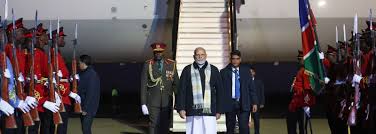PM Modi arrives in Namibia to enhance bilateral ties

In a historic move aimed at redefining India’s role in Africa, Prime Minister Narendra Modi touched down in Namibia on July 9, 2025. This marks the first visit by an Indian Prime Minister to the southern African nation in nearly three decades. As part of his ambitious five-nation tour across the Global South, Modi’s Namibia leg is being hailed as a strategic effort to deepen ties in trade, energy, digital public infrastructure, and cultural diplomacy.
Strengthening Strategic Partnerships
PM Modi’s arrival was met with a ceremonial welcome in Windhoek, where traditional Namibian drums and dance set the tone for a visit rooted in mutual respect and collaboration. His meeting with President Netumbo Nandi-Ndaitwah laid the foundation for a series of high-level dialogues focused on enhancing bilateral cooperation.
Key Focus Areas:
- Mineral Resources: India is seeking long-term partnerships in uranium, lithium, cobalt, and other critical minerals vital for its clean energy, nuclear, and tech ambitions.
- Diamonds Trade: Discussions included establishing direct trade routes for rough diamonds, cutting out intermediaries and reducing costs for Indian jewelers.
- Digital Infrastructure: The launch of India’s Unified Payments Interface (UPI) in Namibia signals a growing wave of fintech diplomacy.
Why Namibia Matters for India
Namibia is rich in natural resources, particularly uranium, which is crucial for India’s civilian nuclear energy program. The country also holds reserves of rare earth elements and lithium—critical for India’s electric vehicle (EV) and semiconductor industries.
The Namibian government, under President Nandi-Ndaitwah, has shown strong interest in tapping into India’s expertise in IT, healthcare, education, and affordable medicine. This visit brings both nations to the table with a clear agenda of mutual growth and long-term collaboration.
Digital Public Infrastructure: A New Diplomatic Tool
One of the highlights of Modi’s visit was the rollout of UPI—India’s signature real-time payment system—in Namibia. With this launch, Namibia becomes the second African nation after Mauritius to integrate Indian fintech solutions. This move underscores India’s shift towards exporting its digital public infrastructure as a soft power tool, especially across the Global South.
Impact of UPI in Namibia:
- Encourages financial inclusion.
- Boosts trade between small and medium businesses.
- Helps in expanding Indian fintech companies in the African market.
Cultural Diplomacy in Action
PM Modi’s engagement wasn’t limited to boardroom meetings. His symbolic gesture of playing traditional Namibian drums during the welcome ceremony was widely appreciated and went viral across African media platforms.
Modi also paid tribute to Namibia’s Founding President Dr. Sam Nujoma, acknowledging the historical ties that trace back to India’s early support for Namibia’s independence struggle. India had backed the South West Africa People’s Organization (SWAPO) and was among the first countries to support Namibia at the United Nations.
Trade and Economic Ties: The Road Ahead
India-Namibia bilateral trade reached nearly USD 650 million in 2023, with Indian investments in the southern African nation crossing USD 800 million. These are primarily in mining, pharmaceuticals, energy, and port infrastructure.
During the visit, India and Namibia signed multiple Memoranda of Understanding (MoUs) covering:
- Energy cooperation, particularly nuclear and green hydrogen.
- Pharmaceutical collaboration, with a focus on affordable medicine.
- Defence training and joint exercises.
- Establishing Centers of Excellence in IT and innovation.
A Boost to India-Africa Ties
PM Modi’s visit also comes at a critical juncture as India prepares for the upcoming India-Africa Forum Summit. By reinforcing ties with Namibia, India is sending a clear message about its long-term commitment to Africa’s development.
What This Visit Signifies for Africa:
- India as a reliable partner—not just for trade, but for technology and capacity-building.
- A shift from aid-based to partnership-based cooperation.
- An alternative to China’s resource-focused model of engagement.
Environmental & Wildlife Cooperation
Discussions also touched upon the future of “Project Cheetah,” a wildlife exchange initiative between the two nations. Namibia was the first country to send cheetahs to India as part of efforts to reintroduce the species in the Indian ecosystem. The project, despite challenges, is viewed as a symbol of ecological diplomacy.
Geopolitical Importance
This visit is more than just bilateral—it’s about rebalancing global influence in Africa. At a time when nations like China and the U.S. are vying for dominance across African markets, India’s approach of blending trade, culture, and technology creates a unique footprint.
What Makes India’s Approach Different:
- Focus on capacity-building.
- Investment in human capital through education and training.
- Exporting digital solutions rather than debt-driven projects.
Conclusion
PM Modi’s visit to Namibia is a landmark moment in India’s foreign policy and a major step toward reshaping its engagement with Africa. Through energy partnerships, fintech integration, cultural outreach, and diplomatic symbolism, the visit lays the groundwork for a deeper, more strategic India-Africa partnership.
Namibia, in turn, gains a committed development partner in India—one that respects sovereignty, invests in people, and shares global aspirations for a more equitable world order.






